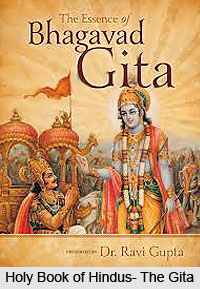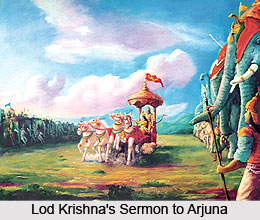 Mysticism in Bhagavad Gita is propounded by Lord Krishna, while in his phase of enlightening Arjuna with vitalities of life, philosophy, divinity and after life. The gospel text for Hindus in general was given shape in Mahabharata, into the chapter of historic battle of Kurukshetra. Arjuna`s despondency, desperate state and mental torment, was absolved by Krishna, urging him to do his work and go to battle. Lord Krishna`s human form had then taken on the Almighty self, describing to Arjuna the necessities and works that one requires to perform in the physical, earthly life. He had thus divulged several godly secrets to the mighty third Pandava, incited finally to win the battle from the Kauravas. Yet, amongst all these blood-shed and gore, religion and peace had existed sublime, owing to the Lord`s memorable sermons, at first blanketing Arjuna`s mind entirely. His charioteer in the battle of kin and first-bloods, went on meanwhile to reveal to Arjuna, that profound mysticism, which when followed by experience, liberates one from sin, provided he is a believer.
Mysticism in Bhagavad Gita is propounded by Lord Krishna, while in his phase of enlightening Arjuna with vitalities of life, philosophy, divinity and after life. The gospel text for Hindus in general was given shape in Mahabharata, into the chapter of historic battle of Kurukshetra. Arjuna`s despondency, desperate state and mental torment, was absolved by Krishna, urging him to do his work and go to battle. Lord Krishna`s human form had then taken on the Almighty self, describing to Arjuna the necessities and works that one requires to perform in the physical, earthly life. He had thus divulged several godly secrets to the mighty third Pandava, incited finally to win the battle from the Kauravas. Yet, amongst all these blood-shed and gore, religion and peace had existed sublime, owing to the Lord`s memorable sermons, at first blanketing Arjuna`s mind entirely. His charioteer in the battle of kin and first-bloods, went on meanwhile to reveal to Arjuna, that profound mysticism, which when followed by experience, liberates one from sin, provided he is a believer.
Mysticism in Bhagavad Gita is called "the Premier Science, the Sovereign Secret, the Purest and Best; intuitional, righteous; and to him who practiseth it pleasant beyond measure." Men who are grossly unfaithful in this teaching, can never find the Almighty, but remain lost in the `purlieus of this perishable world.` The whole world is interpenetrated by the Lord Himself, yet His form cannot perceived. All living things have their being within Him, yet He is not restrained by them. Nevertheless, the believers do not consciously abide within Him. Such is His Divine Sovereignty that though He, the Supreme Self, is the cause and upholder of all, yet He remains outside. As the mighty wind, though affecting every place, has no resting place but space, likewise have all these beings no home except Him. All beings return at the close of every cosmic cycle into the realm of Nature, which is a part of the Almighty; and at the beginning of the next He sends them forth again. With the help of Nature, again and again Lord Krishna pours forth the whole multitude of beings, whether they will or not, for, they are ruled ultimately by His will. But these acts of Krishna`s can never bind Him. He remains forever outside and unattached.
Arjuna`s guidance and preachings continue with his Lord of Lords. Under His guidance, according to Krishna, Nature creates all things movable and immovable. Thus it is that this universe revolves. Fools snub Him, perceiving as they do the Lord clad in human form. They are oblivious that in His higher nature He is the Lord-God of all. Mysticism comes at this focal point in Bhagavad Gita, when one requires that believing eye to perceive God. A fool`s hopes are vain, their actions insignificant, their knowledge futile; they are without sense, deceitful, barbarous and godless. But the Great Souls filled with His Divine Spirit, they worship Him, they fix their minds on Him and on Him alone, because they know that He is the imperishable Source of every being. Always glorifying Him, arduous, loyal in their vows, prostrating themselves before Him, they venerate Him persistently with concentrated devotion. Other souls also worship Him with full consciousness, as the One, the Manifold, the Omnipresent, the Universal.
 Krishna discloses Himself as "the Oblation, the Sacrifice, and the Worship; I am the Fuel and the Chant, I am the Butter offered to the fire, I am the Fire itself; and I am the Act of offering." He is the Father of the universe and its Mother; He is its Nourisher and its Grandfather; He is the Knowable and the Pure; He is Om and also within the Sacred Scriptures. Mysticism in Bhagavad Gita counsels that Krishna is the Goal, the Sustainer, the Lord, the Witness, the Home, the Shelter, the Lover and the Origin; He is Life and Death; He represents the Fountain and the Seed Imperishable. He is present in the Heat of the Sun; He releases and holds back the rains; He is there in Death and Immortality; He is in fact the Being and Not-Being. Those who are well-read in the scriptures, who drink the mystic `soma-juice` and are purified from sin, but who while worshipping Him with sacrifices wish that He will lead them unto heaven; they reach the holy world where abides the Controller of the Powers of Nature; they thus relish in the feasts of Paradise.
Krishna discloses Himself as "the Oblation, the Sacrifice, and the Worship; I am the Fuel and the Chant, I am the Butter offered to the fire, I am the Fire itself; and I am the Act of offering." He is the Father of the universe and its Mother; He is its Nourisher and its Grandfather; He is the Knowable and the Pure; He is Om and also within the Sacred Scriptures. Mysticism in Bhagavad Gita counsels that Krishna is the Goal, the Sustainer, the Lord, the Witness, the Home, the Shelter, the Lover and the Origin; He is Life and Death; He represents the Fountain and the Seed Imperishable. He is present in the Heat of the Sun; He releases and holds back the rains; He is there in Death and Immortality; He is in fact the Being and Not-Being. Those who are well-read in the scriptures, who drink the mystic `soma-juice` and are purified from sin, but who while worshipping Him with sacrifices wish that He will lead them unto heaven; they reach the holy world where abides the Controller of the Powers of Nature; they thus relish in the feasts of Paradise.
Mysticism in Bhagavad Gita is further heightened and intensified when Krishna states that although such believers enjoy the spacious glories of Paradise, nonetheless, when their merit is depleted, they are born again into the world of mortals. Though they have followed the letter of the scriptures, yet, because they have sought but to fulfill their own desires, they need to digress and return again and again. But if a man is willed to meditate on Him and Him alone and vows to worship Him always and everywhere, He shall then take upon Himself the fulfillment of his aspirations; He will safeguard whatsoever he shall attain. Even those who venerate the Lesser Powers, if they do so with conviction, they thereby worship Him, though not in the right manner. The Lord is the willing recipient of sacrifice and He is its true Lord. But they do not however are aware of Him in truth and hence they sink back. The adherents of the lesser Powers go to them; the devotees of spirits go to them; "they who worship the Powers of Darkness, to such Powers shall they go; and so, too, those who worship Me shall come unto Me."
Whatever a man offers to Him, whether it be a leaf, or a flower, or fruit, or water, He will be glad to accept it, for it is being offered with devotion and cleanliness of mind. Whatever one performs, whatever one eats, whatever one plans to sacrifice and give, whatever austerities one practices, all these are done as an act of offering to Him. One`s action shall one`s action be attended by no result, either good or bad; but through the spirit of renunciation one shall reach Him and be liberated. Mysticism in Bhagavad Gita is somewhat cleared when Krishna speaks that He is the same to all beings, He favours none and he hates none. But those who worship Him devotedly, they reside within Him, and He resides within them. Even if the most sinful worships Him with his whole heart, shall be considered righteous, because he is treading the right path. He shall achieve spirituality before long, and Eternal Peace shall be his forever. Arjuna is made to apprehend that one needs to believe Him; His devotee is never lost on him. If only the children of sinning parents and those miscalled the weaker sex and merchants and labourers will make Him their refuge, they are bound to attain the Highest.
It is, as a conclusion, useless to mention the holy Ministers of God, the devotees and the saintly rulers, who venerate the Lord wholly. Hence, mysticism in Bhagavad Gita is somewhat cleared by Krishna while describing to Arjuna. Therefore, Krishna advises Arjuna, who was born in this changing and miserable world, to worship Him and Him only to attain that blissful state where he can reside within Him. Krishna also counsels to men in general to "fix thy mind on Me, devote thyself to Me, sacrifice for Me, surrender to Me, make Me the object of thy aspirations, and thou shalt assuredly become one with Me, Who am thine own Self."



















